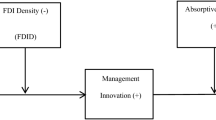Abstract
While a large body of research in the context of multinational corporations (MNCs) indicates that increases in knowledge transfer lead to better subsidiary performance, some studies suggest otherwise. When does knowledge transfer in a MNC benefit its foreign subsidiaries? To answer this question, this study extends the literature on knowledge transfer in MNCs by exploring how two sources of knowledge transfers, one from headquarters and the other from peer subsidiaries, influence a focal subsidiary’s capabilities and firm performance. Drawing on the tenet of the resource-based and dynamic capabilities perspectives, and using data from 167 foreign subsidiaries in China, we propose and find that both sources of knowledge transfers positively influence a focal subsidiary’s capabilities, albeit at different rates. Our results further show that while a focal subsidiary’s innovative culture strengthens the effect of headquarters knowledge transfer on its capabilities, it weakens the impact of peer subsidiary knowledge transfer on the focal subsidiary’s capabilities. More results and their implications are discussed toward the end.
You have full access to this open access chapter, Download conference paper PDF
Similar content being viewed by others
Keywords
- Subsidiary Performance
- Knowledge Transfer
- Multinational Corporations (MNCs)
- Innovative Culture
- Peer Subsidiaries
These keywords were added by machine and not by the authors. This process is experimental and the keywords may be updated as the learning algorithm improves.
While a large body of research in the context of multinational corporations (MNCs) indicates that increases in knowledge transfer lead to better subsidiary performance, some studies suggest otherwise. When does knowledge transfer in a MNC benefit its foreign subsidiaries? To answer this question, this study extends the literature on knowledge transfer in MNCs by exploring how two sources of knowledge transfers, one from headquarters and the other from peer subsidiaries, influence a focal subsidiary’s capabilities and firm performance. Drawing on the tenet of the resource-based and dynamic capabilities perspectives, and using data from 167 foreign subsidiaries in China, we propose and find that both sources of knowledge transfers positively influence a focal subsidiary’s capabilities, albeit at different rates. Our results further show that while a focal subsidiary’s innovative culture strengthens the effect of headquarters knowledge transfer on its capabilities, it weakens the impact of peer subsidiary knowledge transfer on the focal subsidiary’s capabilities. More results and their implications are discussed toward the end.
Author information
Authors and Affiliations
Corresponding author
Editor information
Editors and Affiliations
Rights and permissions
Copyright information
© 2016 The Academy of Marketing Science
About this paper
Cite this paper
Lee, R.P., Li, J. (2016). Is Knowledge Transfer Within MNCs Good for Subsidiary Performance? The Role of Subsidiary Capabilities and Innovative Culture. In: Groza, M., Ragland, C. (eds) Marketing Challenges in a Turbulent Business Environment. Developments in Marketing Science: Proceedings of the Academy of Marketing Science. Springer, Cham. https://doi.org/10.1007/978-3-319-19428-8_32
Download citation
DOI: https://doi.org/10.1007/978-3-319-19428-8_32
Publisher Name: Springer, Cham
Print ISBN: 978-3-319-19427-1
Online ISBN: 978-3-319-19428-8
eBook Packages: Business and ManagementBusiness and Management (R0)




